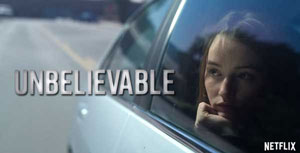When TV scholars look back years from now at trends in storytelling structure, I suspect “Unbelievable” (Netflix) will be seen as a pivotal show. The approach of releasing whole seasons at once was pioneered by Netflix several years ago, but most shows still operate as if they are airing weekly in hour-long segments. “Unbelievable” is a rare show that totally embraces the fact that all eight of its episodes will be immediately available.
It uses the first of its eight episodes to tell the story of the rape of Lynwood, Wash., college student Marie Adler (“Booksmart’s” Kaitlyn Dever), who grew up in foster care. The second lead, Colorado detective Karen Duvall (“The Walking Dead’s” Merritt Wever), enters in the next episode. And a detective in another Colorado city, Grace Rasmussen (Toni Collette), enters in episode three. A slow build like this would never be allowed in the old days of weekly release network TV, but it’s exactly right for “Unbelievable.”
Marie’s story has nothing to do with the Colorado-based serial rape investigation, but has everything to do with the emotional thrust of the series: the wrongness we feel that she has been dismissed while the crimes continue. Creators Susannah Grant, Michael Chabon (a novelist who helped craft “Spider-Man 2”) and Ayelet Waldman – adapting a true story from 2008-11 that was chronicled by journalists Ken Armstrong and T. Christian Miller – first let us get to know Marie, the details of the rape, and most importantly, the details of her hospital evidence-collecting experience and interviews with the police.
Out of context, it sounds unlikely that someone would be raped, then retract her statement and say she lied about the rape, unless there was some crazy extenuating circumstance like a threat from the rapist. But all that happens is Marie is anxious and jittery, she’s not good with recalling details of a traumatic event, and she wants this ordeal to be over with.
Meanwhile, the detectives – led by Eric Lange’s Parker — have recently heard about a false rape accusation in a neighboring jurisdiction. Parker means well but has a blind spot for the idea that a victim being bad with details doesn’t necessarily mean she’s lying. Parker is not an evil man, and is probably good at his job most of the time, but he should be familiar with people being flustered around the police.
Marie is contrasted in the next episode by Amber (Danielle Macdonald), who keeps track of every little detail of her rape, anticipating her upcoming interviews with police in a way Marie does not. Duvall’s measured, caring treatment of Amber throughout the hospital and interview processes is also a marked contrast.
“Unbelievable” settles into being a two-track show, interspersing Marie’s life with Duvall and Rasmussen piecing together this serial rape case as they learn about more victims, including another one — Annaleigh Ashford’s Lilly — who got a raw deal from the initial investigators. I felt anger in episode one over what was happening to Marie – and my blood boiled more after a later twist — but there’s a certain comfort to the storytelling structure, because I knew the endgame would be Marie’s vindication.

The bulk of the series features the rock-solid cop work done by Duvall and Rasmussen, whose team is rounded out by others who are great at their jobs: RoseMarie (Dale Dickey), a rare older woman who is a stone-cold expert in computer forensics; eager-to-please intern Elias (Omar Maskati); and assistant Mia (“Dollhouse’s” Liza Lapira, who I’m always glad to see). Collette gives her usual standout performance, seemingly without effort, and Wever tries hard to keep up. This contrast perfectly translates to the people they are playing, and Wever’s turn had very much grown on me by the end.
“Unbelievable” digs into dark corners of life, not only through the rapes but also through the everyday raw deals that everyone will encounter at some point (even though Marie’s is extreme). There’s not a lot of titillating or graphic imagery, yet the shock of the victims translates to the viewer. And to cap off all the systemic screw-ups, we’re also reminded that when city employees mess up, taxpayers pay for it. Watching an episode immediately before going to bed is not a great idea; it’s best to chase it with something lighter, like a “Saw” film.
Yet the lingering feeling of “Unbelievable” is hopefulness. These eight episodes are like a more in-depth version of a film chronicling a complex investigation, such as “Spotlight,” illustrating that justice is not found at the end of a straight path.
Netflix labels this as a limited series, but here’s a way for “Unbelievable” to have even more long-ranging positive vibes: Grant, Chabon and Waldman should oversee more seasons about remarkable true crimes that take us through the dark and into the light.

